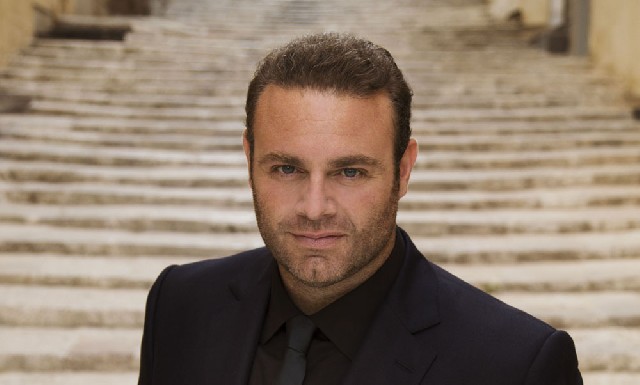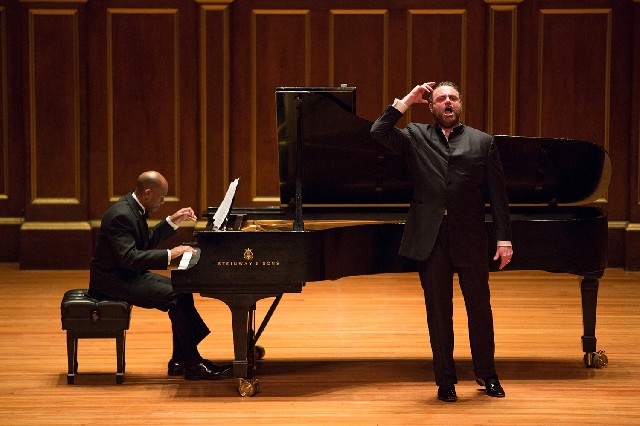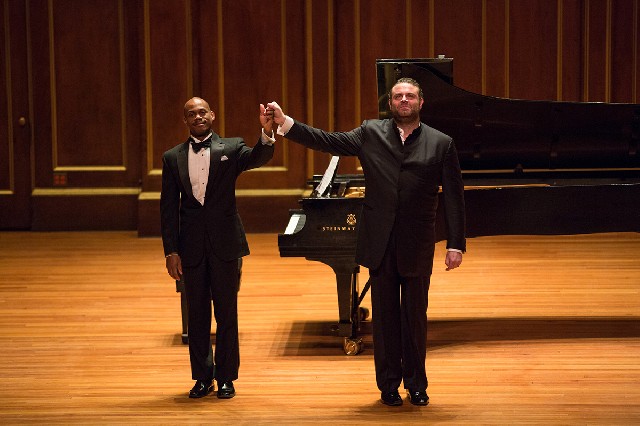Tenor Joseph Calleja Wows Crowd at Jordan Hall
Maltese Tenor Heralds Return of Romantic Singing
By: David Bonetti - Apr 23, 2015
A Vocal Recital by Joseph Calleja
Songs by Tchaikovsky, Caldara, Pergolesi, Donaudy and Tosti and arias by Massenet, Offenbach, Cilea, Verdi and Puccini
Joseph Calleja, tenor
Kevin Miller, piano
Presented by Celebrity Series of Boston at the New England Conservatory’s Jordan Hall
April 17, 2015
Malta is known for two or three things: its crusader Knights, its falcon of movie fame and, for art lovers, a couple of paintings left there by Caravaggio during his exile from Rome. Now, the small island republic (population less than half a million), set in a strategic spot in the Mediterranean between Sicily and Tunisia, has another claim to fame: tenor Joseph Calleja, often billed “the Maltese tenor,” the exoticism of that designation apparently adding to his allure.
At 37, with an international career that extends far from Malta to London, New York, Chicago, Barcelona, Vienna and Berlin and other cities where opera thrives in fully realized form, Calleja doesn’t need a distinguishing moniker. He is the real thing, a full-voiced, passionate Italianate tenor with a honey-toned, heart-melting voice and charisma to burn. Like the great singers, he makes it sound easy as he moves through the vocal registers and changes his vocal dynamics from pianissimo to fortissimo, in plain words from soft to loud. In everything he sings, his nerve-endings seems to be exposed. We haven’t heard his like since Franco Corelli and the young Luciano Pavarroti. Today, his only peers are the French-Sicilian Roberto Alagna and the German Jonas Kaufmann. Each has his own strengths and accompanying weaknesses – although we’ve yet to detect any imperfections in Kaufmann - but each keeps the flame of golden age romantic singing burning.
Calleja gave an old-fashioned opera-singer recital. There was no German song cycle (Robert Schumann’s “Frauenliebe und leben”), as Renée Fleming gamely presented late last year with unimpressive results. Calleja opened with a trio of songs, two by the early Italian composers, Antonio Caldara and Giovanni Battista Pergolesi, in the old-fashioned manner. Calleja will not be singing in baroque opera rarities by Stradella or Scarlatti anytime soon, but he did produce a delectable trill on the word “t’adorerò” in the Caldara that showed he has not totally ignored the early music movement. The sign that Calleja can operate outside formula was his opener, a song by Tchaikovsky sung in perfect idiomatic Russian. There were two more songs from the traditional Italian repertory after the intermission. And then there were the encores. About which, later.
Opera singers who give recitals today often shy away from singing opera arias, acknowledging the difference of singing only with piano-accompaniment rather than orchestra, only ending their concerts – usually an encore – with an opera aria. In the old days, that didn’t bother opera singers, and it didn’t bother Calleja, either. At the end of each half of his relatively brief program, he sang famous arias, two by French composers in the first half and three by Italian in the second. There’s no debate that something important is lost when arias written for full orchestral accompaniment are sung with a piano. (And American pianist Kevin Miller was a dutiful accompanist, if occasionally a little too heavy handed.) But if Calleja had limited himself to songs, we wouldn’t have heard the full passionate throb of his voice in “Lamento di Federico” from Francesco Cilea’s opera “L’arlesiana.” In translation, the words are generic: “Why must I suffer so very much?/She, as always speaks to my heart./Fatal vision, leave me!/You hurt me so deeply! Alas!” But Calleja’s ringing voice made anyone with a heart in the audience feel Federico’s pain as his or her own.
It was no secret that Calleja was suffering from a cold. He had pulled out of the previous Saturday’s matinee production of Verdi’s “Don Carlo” at the Met, which is broadcast internationally on the radio – you don’t do that unless you’re really sick. There were signs that he had not fully recovered. During intermission more than one audience member grumbled that he should have substituted something less challenging than Massenet’s “Pourquoi me réveiller” from “Werther,” in which he was audibly hoarse. I was happy to hear him sing it, imperfect as it was – it was better than what 90 percent of healthy tenors are capable of. Calleja brought great sensitivity to his interpretation of what is arguably Massenet’s greatest aria. His first repeat of the title question (“Why do you awaken me”) was sung with the softest of whispers. But only a few moments later, at the end of the strophe, he sang the line with full-out, unbridled passion, loud enough to reach the farthest reaches of the cheap seats at the Met. This is why a handful of singers internationally get paid the big bucks – and why we, in Boston, get to hear them, if at all, only in concert. (Thank you, Celebrity Series!) Even in the “Lamento di Federico,” which I found so satisfying, there was a rough patch before he reached his ringing finale.
Calleja, a burly man with an apparent lust for life, was a charmer, a jokester, an entertainer. In some ways, he seemed like a big kid possessed with an outside instrument. Walking on stage to tumultuous applause, he looked over the audience and pretended to walk off, saying ‘thank you.’ Between every song there was patter, most of which I unfortunately was unable to hear. While there was no problem hearing his singing voice, his speaking voice did not project. If he continues to talk to the audience, he should get his vocal coach to teach him how to project spoken language, or use a microphone as Fleming and other veterans of the recital format do.
The fact that Calleja made such an impression in an aria by Cilea, a verismo composer seldom heard in opera houses these days, suggests that he could be the avatar of a verismo revival suggested in an article by Zachary Woolfe in the April 12 Sunday New York Times.
There has been a major reordering of priorities in the opera world over the past 25-30 years. The early music movement has triumphed. Historically informed performances of once seldom heard composers are now part of the regular operatic diet. Boston music organizations have been in the forefront, at least in the United States, of the trend. And I have no problem with that. I love the fact that Monteverdi, Handel and Rameau are now regularly presented in stylistically appropriate productions with singers skilled in the formal demands of Baroque opera, and that Mozart and the bel canto composers are being performed the way they were originally heard. Preternaturally curious mezzo-soprano Cecilia Bartoli came out recently with a recording of “Norma” based on Vincenzo Bellini’s original manuscript, using period instruments, in which the title character had a lower voice, what we call a mezzo-soprano today, and the secondary character, Adalgisa, today sung by mezzos, was originally conceived for a higher, soprano voice. The result: thrilling, if unlikely to seriously effect how opera companies produce Bellini’s masterpiece in the future.
Maybe Bartoli’s experiment marks the high water of the early music movement – there was a full-page ad for it in the 2013 Boston Early Music Festival program. As Baroque and bel canto opera grew in popularity, taking over slots in opera companies’ schedules internationally, much of the late 19th century romantic operatic literature, which had once been dominant, was sidelined and eventually forgotten. (And let’s be frank – a lot of Baroque opera is a long slog padded out with formulistic set pieces.) As Woolfe suggested, maybe it’s time for another reordering.
But you have to be careful: verismo, which was inspired by naturalist Italian fiction and theater, is a mixed bag. (What artistic movement is not?) Verismo classics by Puccini, Pietro Mascagni (“Cavalliera rusticana”) and Ruggiero Leoncavallo (“I Pagliacci”) have held the stage, but many of its once cherished works are terminally dated dramatically and musically mediocre. “Ebben? N’andro lontana,” the soprano aria that became a popular hit because it was used in the film “Diva,” is ravishing, but there’s nothing else in Alfredo Catalani’s opera “La Wally” of equal musical appeal. Likewise, the brief tenor aria, “L’amor ti vieta” from Umberto Giordano’s “Fedora” is lovely, but aside from a piano solo, there’s not much else there.
Still, I’d love to hear a production of Mascagni’s “L’Amico Fritz” or “Iris” or even Cilea’s “Adriana Lecouvreur.” Puccini’s “La Fanciulla del West” (the Girl of the Golden West), which Anthony Tommasini in the New York Times suggested might be his masterpiece, is a seldom-produced verismo landmark. Last season, Boston’s adventurous Odyssey Opera presented entertaining, fully staged productions of Mascagni’s “Zanetto” and Ermanno Wolf-Ferrari’s “Il Segreto di Susanna,” both one-acters, which proved more than stage-worthy.
Calleja is one of several contemporary singers who could bring those works back to the opera stage.
OK, enough – maybe too much - of a digression: Back go the recital. Among the opera arias, a highlight was a narrative about a dwarf from Jacques Offenbach’s popular “Tales of Hoffmann,” in which Calleja showed his penchant for physical comedy, knocking his knees together as the narrator relates how the dwarf, Kleinzach, was wont to do. Calleja threw himself fully into the narrator’s role, bringing to life a story that is often, to today’s sensibilities, slightly embarrassing.
The recital had a “story-of-my-life-and-career” quality to it. Calleja first sang on the opera stage at the age of 19 as Macduff in Verdi’s “Macbeth.” His rendition of it Friday night was surprisingly unmoving – when staged, it can be an emotional highlight of the opera. Calleja ended the formal part of the concert with Caravadossi’s “E lucevan le stelle” from Puccini’s “Tosca,” to my ears, one of the two or three greatest tenor arias in the repertory. He prefaced his performance with the comment that Puccini was really the first film composer, but I could not hear his brief explanation of why he felt that way. Calleja did it justice, his voice falling to a whisper as he remembered his moments of intimacy with his lover Tosca. But he failed to make his final lines, “L’ora e fuggita, e muoio disperato,/E non ho amato mai tanto la vita!” (I die hopeless, despairing,/and never before have I loved life like this) the devastating declaration it is. Lesser singers have reduced me to tears at that moment. Calleja was surprisingly cool, although to his credit, he did not end it with the sobs many of his predecessors have added to the score.
Let me report: the audience, which was large but did not fill Jordan Hall, was ecstatic through most of the evening, delivering ovation after ovation. There was a man seated near me, who hooted and whistled and screamed “bravissimo” after “bravissimo.” (This is the kind of madness a great singer, even on an off night, generates among lovers of the vocal arts.) He didn’t seem to care, even if he noticed, that at crucial moments Calleja was not in his best vocal shape.
The pay-off for vocal recitals is, for reasons, I’ve never totally understood, the encores. Isn’t it enough that the diva or divo has sung some of the great masterpieces of the repertoire during the body of the concert? Really, what do you need after “E lucevan le stelle”?
With a concert that was less than an hour in length, Calleja proved generous in his encores, milking, as all soloists do, the audience for applause heaped on applause. (And this audience was happy to supply it.) He sang five encores, returning to his adoring fans, asking, “You like?” and then teasing them by saying that since his recital had been so light in nature, he would sing a contemporary Dutch song cycle for an encore. Cute, but it also reveals a regrettable lack of interest in music of the last 75 years.
No fears, Calleja delivered the goods, singing popular songs in Italian, Spanish, French and English. (It’s too bad he didn’t include a song in Maltese, a language with Semitic roots.) The highlight among them, maybe the highlight of the evening, was his heart-felt rendition of Edith Piaf’s “La Vie en Rose,” for which he left the stage, singing among the audience. You could see a couple of women swoon at his approach, one offering her wrist for a kiss. (Calleja resisted.) Unfortunately, he ended with the one clunker of the evening, Rodgers and Hammerstein’s saccharine “You’ll Never Walk Alone,” a song I’ve hated since I heard it for the very first time, probably when I was ten years old. Calleja has cited Mario Lanza’s “The Great Caruso” as one of his formative influences. That piece of Rodgers and Hammerstein drivel was a Lanza favorite. Alas, Calleja’s interpretation of the song failed to make one reconsider it. His English singing is not as good as his Italian and French. I would have preferred him ending his concert with “Per te partiró,” the Andrea Bocelli hit that has kept the spirit of Neapolitan song alive for a new generation. It’s a song he has sung persuasively, trumping the droning Bocelli at his own game. I guess he felt he had to pander to his American audience with an American song. Bad decision.
Still, it was a thrilling if imperfect evening I won’t soon forget.




